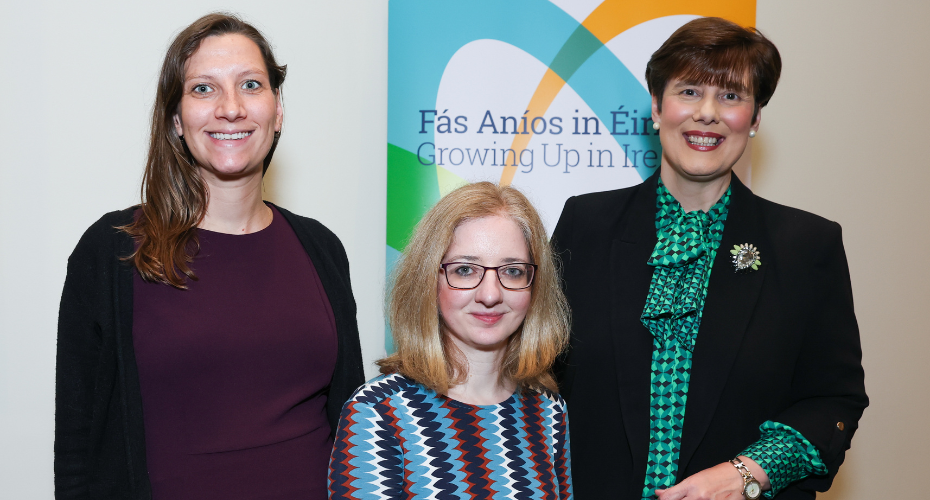Minister Norma Foley launches “What we know from Growing Up in Ireland” Study by UCD Researchers
Minister for Children, Disability and Equality Norma Foley, has launched a new Growing Up in Ireland report on child well-being. Pictured at the launch of the “Growing Up in Ireland” study were Dr Kaat Philippe (UCD School of Public Health, Physiotherapy and Sports Science), Associate Professor Seaneen Sloan (UCD School of Education), and Minister for Children, Disability and Equality Norma Foley
Pictured at the launch of the “Growing Up in Ireland” study were Dr Kaat Philippe (UCD School of Public Health, Physiotherapy and Sports Science), Associate Professor Seaneen Sloan (UCD School of Education), and Minister for Children, Disability and Equality Norma Foley
(opens in a new window)Growing Up in Ireland, jointly run by the Department of Children, Disability and Equality, and the Central Statistics Office (CSO) is a national study of over 28,500 children and young people growing up in Ireland, which is designed to gain insight into their lives. The study tells the continuing stories of three generations of children: those born in 1998, 2008 and 2024.
The (opens in a new window)“What we know from Growing Up In Ireland” study was prepared by UCD researchers Dr Kaat Philippe and Associate Professor Ross Neville from the UCD School of Public Health, Physiotherapy and Sports Science, and Associate Professor Seaneen Sloan from the UCD School of Education. The researchers distilled the key learnings on child well-being from over 300 papers based on the Growing Up in Ireland study and aimed to identify the key factors which impede or support child well-being, the extent to which these are socially patterned and the resulting policy opportunities. The report will serve as a useful resource for policymakers in the area and showcases the value of the data generated by Growing Up in Ireland.
Some of the key findings from the “What we know from Growing Up In Ireland” study include:
- Bullying and family adversity (such as lower socio-economic status, parental illness and stress) are significant risks to a child’s emotional development and well-being
- Strong relationships with parents and peers, safe local facilities, and structured sports are key protective factors for a child’s emotional development and well-being
- Adolescent girls in the study reported higher levels of anxiety and emotional difficulties, while adolescent boys demonstrate higher levels of anti-social behaviour
- Screen time for children has increased markedly during the study and is associated with lower levels of wellbeing and physical activity
- Boys generally scored higher in maths at 9 and 13 years, but girls scored higher in literacy levels at 15 years and achieved higher overall Leaving Certificate results
- Boys were consistently more physically active, while girls engaged in lower levels of physical activity, as did children with chronic illness, disabilities, developmental delays, higher Body Mass Index and those from more disadvantaged backgrounds.
Minister Foley said:
"The Growing Up in Ireland study continues to provide unique insights into three generations of Irish children. It is tracking their unique and personal experience of childhood, adolescence and adulthood in contemporary Ireland. This latest research by UCD into the key learnings from the Growing Up in Ireland data will serve as a useful resource for my Department and other Government departments in devising policies to support and encourage the wellbeing of all children and young people in our country.”
Further information about Growing Up in Ireland and the launch of the “What we know from Growing Up in Ireland” study can be found (opens in a new window)here.
4th November 2025